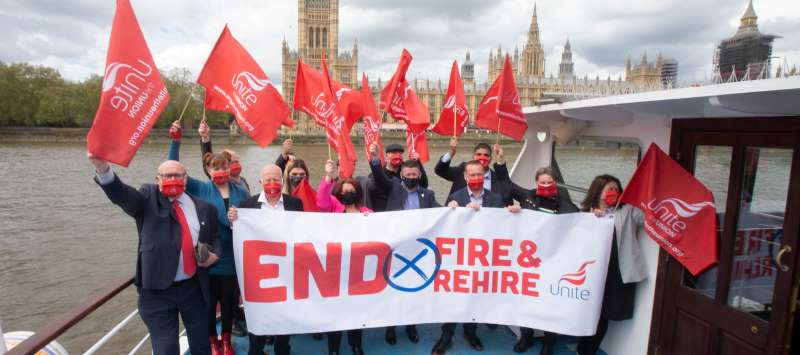‘Leopards don’t change their spots’
In a cynical move to falsely rebrand itself as the party of working people, the Tories today (May 15) announced a raft of policies offering greater employment rights and protections.
But even a cursory look at their policies shows that they fail on their own grounds, and fall far short of the wholesale overhaul pledged by Labour to undo the systematic attacks on workers’ rights and wages wrought by the Tories over the last seven years.
Minimum wage
The minimum wage for over 25s, now set at ÂŁ7.50, was under former chancellor George Osborne, set to increase to ÂŁ9 an hour by 2020. But in new Tory plans published today under the leadership of prime minister Theresa May, the party said that the minimum wage would rise each year but only â€in line with median earnings.’
Given unprecedented wage stagnation over the last several years which looks set to continue, this would mean a minimum wage very incrementally rising to an estimated £8.20 by 2020 — effectively robbing workers on the minimum wage £2,283 over the next three years.
Labour’s national campaign co-ordinator Ian Lavery said in response that the prime minister was “taking working people for fools”.
“This morning she claimed she was standing up for working people, but hidden in the small print of her announcement is a cut to working people’s incomes,” he said.
“The Tories cynical ploy to pull the wool over voter’s eyes won’t work.
“Today’s ridiculous claims are yet more evidence that this election is a choice between a Tory party that fails working people and a Labour Party that will stand up for working people and deliver a better, fairer Britain.”
Labour has pledged to increase the minimum wage to a Real Living Wage of £10 an hour — and will abolish the lower rates for under 25s, a move that would leave many younger workers £4,500 better off.
U-turn
In addition to watering down the value of its own minimum wage set by its predecessor government, the Tory party has likewise watered down a pledge Theresa May herself made last year.
“If I’m prime minister … we’re going to have not just consumers represented on company boards, but workers as well,” Theresa May said unequivocally in July during her campaign to be the next leader of the Tory party after David Cameron resigned.
Now, however, worker representation is reduced in the Tories’ latest campaign pledge to listed companies choosing their own director to represent employees or creating â€stakeholder advisory panels’. Companies actually having employees on company boards will be non-compulsory.
Other policies announced by the Tories today to purportedly support workers struggling under the biggest drop in living standards since Victorian times will, on closer inspection, only benefit the already wealthy.
Giving workers a statutory right to 52 weeks of leave to care for a relative will mean little for the vast majority of the workforce because this leave is unpaid — only those very few who can afford to take so much time off will be able to.
“Because it is women who are mostly carers, caring itself is written out of what is thought of as the productive economy,” notes Guardian columnist Suzanne Moore. “We do it for free. Meanwhile, there is a huge and ever-growing crisis in social care. Thus, in the name of â€workers’ rights’, what is being suggested here is possibly a little bit more flexibility for women, who are presumably supported by a partner, to care for elderly relatives.
Voting record
Critics of the latest Tory ploy to win over traditional Labour voters say May’s warm words for working people are totally undermined by her voting record.
As an MP and home office secretary, Theresa May has time and again voted against the interests of working people — she voted in favour of the Trade Union Act; she supported employment tribunal fees which bar access to workplace justice for all but the few; and she has continuously supported the public sector pay cap, among other anti-worker measures.
Most recently, she tried to levy higher taxes on the self-employed, most of whom are among the lowest earners in the economy. The policy was so toxic that the government was forced to take a U-turn.
Speaking on the BBC today (May 15), Unite assistant general secretary Howard Beckett urged voters to see through the Tory spin.
“Let’s judge the Tories under Theresa May on her record — zero hours contracts, employment tribunal fees, and the Trade Union Act, the most pernicious anti-worker legislation in the last century,” he said. “Leopards don’t change their spots. At best this is vacuous; at worst, this is more Tory lies.”
Although the Tories today pledged to keep workers rights’ derived from the EU, such rights will be guaranteed only through secondary legislation and not primary legislation — meaning they can easily be rolled back.
Unite general secretary Len McCluskey argued that even if you do take Theresa May on her word, there are far too many Tory MPs now who have shown nothing but contempt for working people.
“It is good news that the prime minister accepts the importance of the rights we have derived from the EU, but there is no way that working people can rely on the rest of her party feeling the same way,” he said.
“Already there are those on her benches itching to scrap basic protections, like the working time directive, which keep workers and the public safe but are decried as needless red tape by many hard right Tories.
“The Conservatives can never be the party of working people,” he added.  “Remember this is the party that has put workplace justice beyond the reach of ordinary people and caused wages to roll backwards.
“Remember too that the Tory party rammed through the malicious Trade Union Act because it saw six million working people – the people who care for our children, our sick, our streets and keep our shops stocked –  as â€enemies of the state’.
“Theresa May’s promises to workers need to be regarded in the same light as her promise not to call another election – that is, not worth the paper they are written on.”
 Like
Like Follow
Follow


